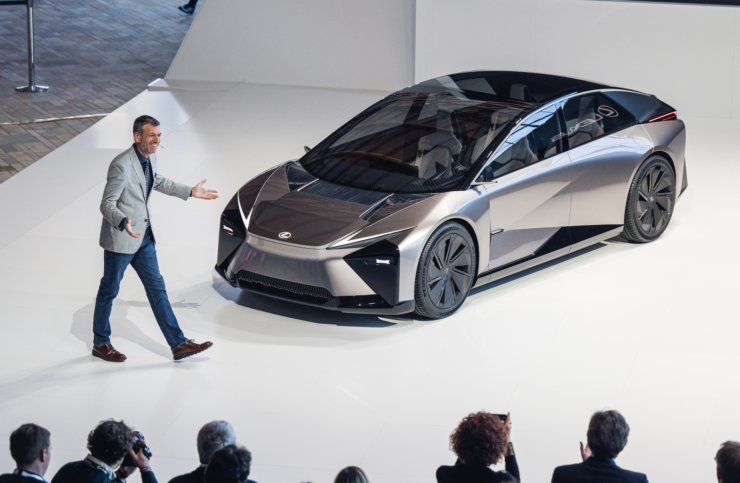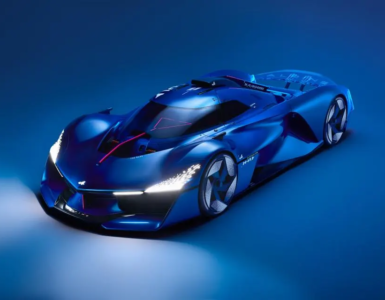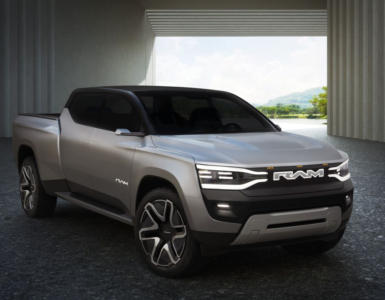Toyota – new battery and fuel cell electric vehicles to reinforce multi-pathway approach to carbon neutrality.
At Toyota Motor Europe’s (TME) 2023 Kenshiki event last week, a team of Global and European executives presented the company’s latest electrified products and technologies.
Kenshiki means insight in Japanese and this year’s edition to an audience of over 300 media, focused on the battery electric and hydrogen powered vehicles which will play a significant role in the company’s multi pathway strategy in the years ahead.
Mobility for All
Toyota’s principle of ‘Mobility for All’ and its commitment to achieving full carbon neutrality in Europe by 2040 and globally by 2050 guides the company’s approach to new product development.
🔥 What about we co-host a webinar? Let's educate, captivate, and convert the hydrogen economy!
Hydrogen Central is the global go-to online magazine for the hydrogen economy, we can help you host impactful webinars that become a global reference on your topic and are an evergreen source of leads. Click here to request more details
Speaking at Kenshiki, Simon Humphries, Chief Branding Officer, Head of Design, Toyota Motor Corporation provided further insight into the company’s mindset:
For us, what mobility really comes down to, is freedom. With freedom comes opportunity, and at Toyota, we believe that everyone should have access to the opportunity that mobility provides, wherever in the world they live, whatever the situation and leaving no one behind.
Toyota’s ‘multi pathway’ strategy confirms this thinking, where low and zero emission mobility solutions are designed to meet specific regional needs; products which satisfy customer demand or are relevant to their local infrastructure whilst remaining accessible so that no one is left behind on the journey to carbon neutrality.
Mr Humphries presented several concept models which will spearhead Lexus and Toyota’s next generation battery electric vehicles; he explained that the new modular design architecture combining gigacast chassis, components minimisation and the new Arene operating system, enables design freedom to elevate the entire user experience.
The exciting line-up of future Toyota and Lexus battery electric vehicles presented at Kenshiki are intended to appear on European roads in the coming years – including the Lexus LF-ZC, Toyota FT-Se Toyota FT-3e, Toyota Sport Crossover concept and the Toyota Urban SUV concept.
The Path Towards Carbon Neutrality
TME announced last year, its goal of achieving full carbon neutrality in Europe by 2040.
SBTi Scope 1 & 2 carbon neutrality will be achieved in its European operations and manufacturing facilities by 2030.
For Scope 3, Toyota will achieve 100% CO2 reduction in new vehicles sales in 2035 and, by 2040, full carbon neutrality in value chain and logistics – where TME is already making progress by starting to use hydrogen fuel cell electric trucks on its four key logistics routes from Belgium to Germany, France and Netherlands.
Battery Electric Vehicle Expansion
Yoshihiro Nakata, President & CEO, Toyota Motor Europe commenting on TME’s mid-term product launch plan stated that:
whilst we will continue to offer multiple carbon reduction technologies, we will also steadily increase the number of zero-emissions vehicles we offer to customers.
In Europe, Toyota’s electrified mix is already at 71% and is expected to grow to 75% in 2024, and this will further expand with new battery electric vehicles playing an increasingly significant role in its sales volumes.
By 2026, TME will offer around 15 different zero emission vehicles under the Toyota brand from passenger cars to light commercial vehicles, when Toyota’s European BEV mix is expected to be over 20% and more than 250,000 vehicles per annum.
Turning to hydrogen, Mr Nakata, explained that Toyota retains a confident outlook on its unique role in contributing to the decarbonisation of Europe’s mobility with the momentum of growing infrastructure and availability of green hydrogen.
Toyota’s hydrogen strategy reaches across several mobility sectors; in the passenger car segment, it offers the Mirai and newly launched Crown. In the commercial sector, TME’s Hydrogen Factory Europe, is integrating its current fuel cell technology into trucks, buses, coaches, boats – and pick up trucks as seen in the hydrogen fuel cell Hilux prototype presented at Kenshiki.
Hydrogen technology will be further advanced when Toyota launches its third generation fuel cell systems in 2026.
Addition of Proace Max Completes Toyota Professional Line-up
The Toyota Professional light commercial vehicle line-up is completed by the addition of the new Proace Max, a large van available in three lengths and heights providing customers the versatility the demand.
Like its siblings, the new Proace Max is available with a battery electric powertrain, giving a range of 420km (WLTP) and access to zero-emission zones.
Proace Max joins the newly-updated Proace and Proace City models to offer customers the choice between large, medium and small commercial vehicles – all with the option of a battery-electric powertrain.
Hilux is also a key part of the Toyota Professional fleet, a mainstay of TME’s commercial fleet for customers who value quality, durability and reliability. It will receive another boost next year when a version with a hybrid 48 volt system is introduced, providing more power and torque while improving fuel efficiency by 10%.
Toyota Professional has strong momentum and sales are expected grow in 2023 to over 140,000 vehicles, an increase of more than +20% compared to 2022. A strong product offering is just one part of the equation, with a key differentiator being the recognised customer-service excellence of the retail network.
Toyota’s Paris 2024 Legacy
Further to the earlier hydrogen thread, Matt Harrison, COO, Toyota Motor Europe highlighted that up to ten hydrogen applications will be in operation at Paris 2024. Toyota, as the worldwide mobility partner of the International Olympic Committee and the International Paralympic Committee will provide a passenger vehicle fleet of more than 2650 electrified vehicles and 700 electric last-mile mobility solutions.
Mr Harrison explained that among these solutions are 250 Accessible People Movers (APMs), redesigned for Paris 2024, and built in Europe, to better meet local requirements for Paris: “The vehicle is designed to offer last-mile service and and transport people with accessibility needs.
Kenshiki Deep Dives
A series of Kenshiki product and technology deep dives followed the main meeting:
- Toyota previews expanded dedicated BEV line-up and advanced battery technologies
- World Premiere: Urban SUV Concept
- European Premiere: Sport Crossover Concept
- European Premiere: Toyota FT-3e
- European Premiere: Toyota FT-Se concept
- Land Cruiser: start of online reservation
- Toyota Professional Pushes Forward with Increased Product Power and Leading Customer Service
- All-new PROACE MAX Delivers Strength, Capacity and Efficiency
- New Hilux Hybrid 48V Enhances an Invincible Icon
- Lexus embraces innovation and advanced technologies to become an all-electric luxury brand
- Toyota Hydrogen Factory scaling up its European activities
- Toyota to deliver inclusive electric mobility solutions for all at Paris 2024
Toyota Motor Europe NV/SA (TME) oversees the wholesale sales and marketing of Toyota, GR (Gazoo Racing) and Lexus vehicles and parts and accessories, as well as Toyota’s European manufacturing and engineering operations. Toyota directly employs over 25,000 people and has invested over EUR 11 billion in Europe since 1990. Its eight European manufacturing plants are located in Portugal, the UK, France, Poland, Czech Republic and Turkey. Today, there are approximately 16.5 million Toyota, GR and Lexus vehicles on European roads, whose drivers are supported by a network of 28 National Marketing and Sales Companies and around 2,800 retail sales outlets in 53 countries (EU, UK, EFTA countries + Russia, Israel, Turkey and other Eastern European countries). In 2022, TME sold 1,080,975 vehicles in Europe for a 6.4% market share. For more information, visit Facts & Figures (toyota.eu) and www.toyota-europe.com.
Toyota believes that when people are free to move, anything is possible. In the pursuit of “Mobility for All”, Toyota aims to create safer, more connected, inclusive and sustainable mobility to achieve its mission of producing “Happiness for All”. In Europe, TME launched the KINTO mobility brand which offers a range of mobility services in 14 countries, and is growing its business-to-business sales of zero-emission fuel cell products and engineering support. Contributing to the UN Sustainable Development Goals, Toyota is working to achieve carbon neutrality in its entire business across Europe. A historic leader in CO2 reduction in Europe, TME aims to achieve 100% CO2 reduction in all new vehicles in Western Europe by 2035 and will continue to offer a full range of electrified powertrains to customers across the region with its hybrid, plug-in hybrid, battery and fuel cell electric vehicles.
READ the latest news shaping the hydrogen market at Hydrogen Central
Toyota – new battery and fuel cell electric vehicles to reinforce multi-pathway approach to carbon neutrality. source








